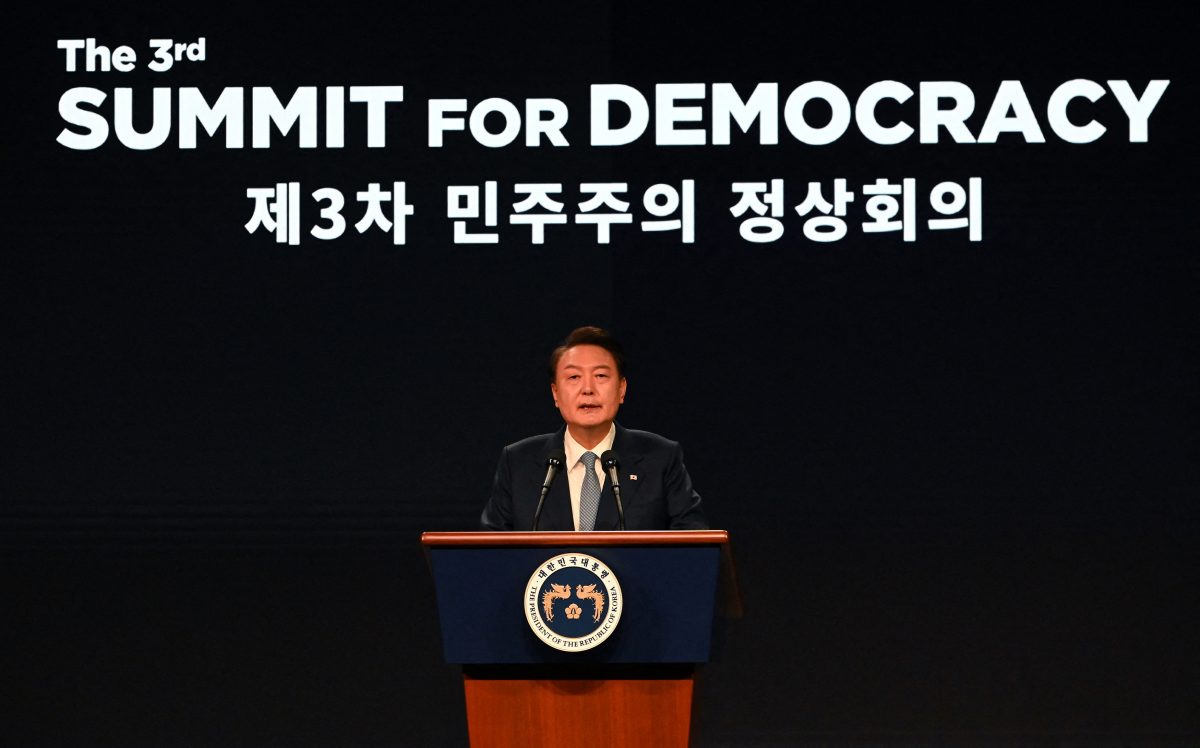SEOUL, (Reuters) – South Korean President Yoon Suk Yeol today called fake news and disinformation based on AI and digital technology threats to democracy, as some officials attending a global summit accused Russia and China of conducting malicious propaganda campaigns.
Speaking at the opening of the Summit for Democracy in Seoul, Yoon said countries had a duty to share experiences and wisdom so that artificial intelligence and technology could be employed to promote democracy.
“Fake news and disinformation based on artificial intelligence and digital technology not only violates individual freedom and human rights but also threatens democratic systems,” Yoon said.
South Korea is hosting the third Summit for Democracy conference, an initiative of U.S. President Joe Biden aimed at discussing ways to stop democratic backsliding and erosion of rights and freedoms.
On Monday, China hit back at Seoul for inviting Taiwan Digital Minister Audrey Tang to give a video address.
Though a presenter said Tang was speaking in a private capacity, her participation was not announced ahead of time by either Taiwan or South Korea, which has boosted ties with Washington but also sought to prevent major impact to its deep economic ties with China.
China claims Taiwan as its own, but the island rejects its sovereignty stance.
Chinese foreign ministry spokesperson Lin Jian said efforts to “expand the space for Taiwan independence activities under the banner of democracy and human rights” were doomed to fail.
DIGITAL THREATS
Digital threats to democracy, and how technology can promote democracy and universal human rights, were expected to be the main agenda of the three-day meetings in Seoul, attended by representatives from more than 30 countries, ranging from Costa Rica to the United States and Ghana.
“As authoritarian and repressive regimes deploy technologies to undermine democracy and human rights, we need to ensure that technology sustains and supports democratic values and norms,” U.S. Secretary of State Antony Blinken told the summit.
Blinken later said 2024 was an “extraordinary election year” to highlight risks of disinformation and falsehoods in cyberspace. He also repeated Washington’s accusations that Russia and China were behind global campaigns aimed at manipulating information.
Blinken said Washington was releasing the first guidance of its kind for tech companies to help prevent attacks on human rights defenders online.
In addition, he said at the summit that a half-dozen more countries, including South Korea and Japan, were joining a U.S.-led crackdown on the misuse of commercial spyware to surveil journalists or human rights defenders.
Some European officials also accused Russia of conducting disinformation campaigns using AI.
“The only thing more gruesome than the Russian actions during their ongoing invasion of Ukraine is the disgusting web of lies spun by Russian propaganda, accelerated by social media, deep fake techniques and omnipresent bots,” said Robert Kupiecki, undersecretary of state at Poland’s foreign ministry.
The Kremlin has repeatedly denied accusations of spreading false or misleading information.
A spokesperson for China’s embassy in Washington had said it was “typical bias and double standard to allege that the pro-China contents and reports are ‘disinformation’, and to call the anti-China ones ‘true information'”.










